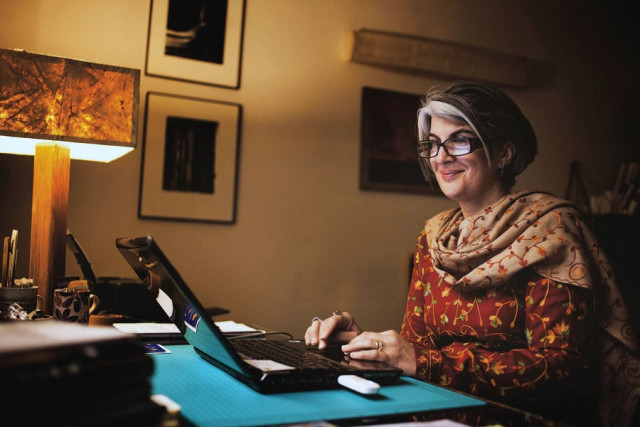Ilona Yusuf: The scribe of the East
Ilona Yusuf is determined to keep the usually neglected genre of poetry alive in Pakistan.

Ilona Yusuf is determined to keep the usually neglected genre of poetry alive in Pakistan. PHOTOS: MYRA IQBAL
This lyrical address description serves as something of a roadmap while one traverses the winding road that leads to the residence of the Pakistani-Polish poet Ilona Yusuf in Bani Gala, Islamabad. Driving past the foliage-lined lanes on a crisp spring afternoon, one wonders if the scenic suburb offers some inspiration to Yusuf’s creative process.

Traces of Yusuf’s writing inspiration can be spotted all over her workspace. Wooden bookcases housing a collection of hard covers and paperbacks on literature and poetry line the walls. There is a printing press, some sheets and linocuts in a corner while another wall showcases two pieces of altered darkroom photos and an abstract painting. The setting speaks volumes of Yusuf’s two primary passions, writing and beautifying spaces, which she indulges in with her small interiors business.
“Most of my writing is done in short spurts,” says the soft-spoken poet who started writing at the age of 10. “I’ve got things floating around in my head but lines would usually come to me at night or early morning and I’d save them up in the night and write them early morning.” Even though she has been writing since a young age, Yusuf recalls the lack of forums in the country for budding writers like herself at the time. “When I was growing up there were writing competitions at the British Council and the American Centre but when I got married, which was during Zia’s regime, there was nothing.” The creative lull in Yusuf’s life was prolonged after the birth of her children as domestic responsibilities took over. “I thought it (writing) was just something I used to do.”
However, things turned around one day when Yusuf went to visit a friend in Lahore who asked her if she was still writing. “When I told her I wasn’t, she said it was a sin to waste a gift like that. That advice just stuck with me.” Not only did Yusuf resume writing but also went on to publish her first collection of poems, Picture This, in 2001.
She cites literary stalwarts like Gerard Manley Hopkins, Pablo Neruda, Octavio Paz, Moniza Alvi, Maki Qureshi and Daud Kamal as some of her key inspirations. Her own work, however, has a distinct voice and dabbles with a variety of subjects from romance and nature to political satire. “Some of my recent poems like Jalebi is political in a roundabout way and then there is The Mechanics of Hearing which I’m told has a lot of sound and visuals to it,” she says. On the other hand her poem, Swat was born out of subtle observations in the valley through different eras. “I went there twice — when I was very little and once when I was married which is when we saw arms coming into Swat in the ’90s. But nobody was conscious of that at the time, there was that build-up, the floggings and the beheadings,” she says. “Even if you are not political, you are conscious of what’s going on to some extent,” she adds.
Along with being a renowned poet, Yusuf also served as the editor for The Alhamra Literary Review, a publication designed to highlight the work of Pakistani writers writing in English. She has presented alongside other writers in the Association of Writers and Writing Programs in America. Her verses have been featured in a profusion of local and international publications, including Sugar Mule, Journal of Postcolonial writing, The Missing Slate and The Chicago Quarterly Review. In 2012, Yusuf, along with the Canadian poet Blaine Marchand, guest-edited Vallum, a Canadian poetry journal that featured 26 Pakistani poets writing in English. Currently, she serves as an art critic for journals like Art Now and Nukta Art.
Even though the audience for Pakistani English prose has risen steadily over the years, English poetry has not witnessed the same trend. “If you want to be a writer, you will write regardless. Writing comes as if it’s like your second skin,” she says. While there is no dearth of good poetry in the country, the lack of awareness about the genre even among the educated circles saddens her. “Everyone is very proud of our local novelists who have acquired international recognition, but when it comes to poetry, its relevance is often questioned.” However, the works of promising poets like Shirin Haroun, Adrian A Husain, Moeen Faruqi, Shadab Zeest Hashmi, Mehvash Amin, Kyla Pasha and Sadaf Halai among others give her hope that things may change soon.
Maryam Usman is an arts and culture reporter at The Express Tribune , Islamabad.
Published in The Express Tribune, Sunday Magazine, April 6th, 2014.



















COMMENTS
Comments are moderated and generally will be posted if they are on-topic and not abusive.
For more information, please see our Comments FAQ